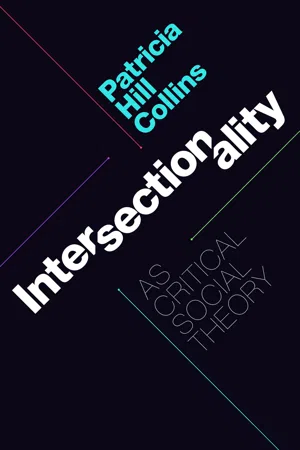
- English
- PDF
- Available on iOS & Android
eBook - PDF
Intersectionality as Critical Social Theory
About this book
In Intersectionality as Critical Social Theory Patricia Hill Collins offers a set of analytical tools for those wishing to develop intersectionality's capability to theorize social inequality in ways that would facilitate social change. While intersectionality helps shed light on contemporary social issues, Collins notes that it has yet to reach its full potential as a critical social theory. She contends that for intersectionality to fully realize its power, its practitioners must critically reflect on its assumptions, epistemologies, and methods. She places intersectionality in dialog with several theoretical traditions—from the Frankfurt school to black feminist thought—to sharpen its definition and foreground its singular critical purchase, thereby providing a capacious interrogation into intersectionality's potential to reshape the world.
Tools to learn more effectively

Saving Books

Keyword Search

Annotating Text

Listen to it instead
Information

PART
I
Framing
the
Issues
Intersectionality
and
Critical
Social
Theory

This
page
intentionally
left
blank

1
Intersectionality
as
Critical
Inquiry
So
much
has
happened
since
the
1990s
that
the
case
for
intersectionality
no
longer
needs
to
be
made.
A
surprising
array
of
academics,
activists,
policy-
makers,
digital
workers,
and
independent
intellectuals
recognize
intersec-
tionality
as
an
important
form
of
critical
inquiry
and
praxis
(Collins
and
Bilge
2016).
Both
within
and
outside
the
academy,
administrators,
teachers,
social
workers,
counselors,
and
public
health
professionals
have
increasingly
used
intersectional
analyses
to
shed
light
on
important
social
problems
con-
cerning
education,
health,
employment,
and
poverty
(Berger
and
Guidroz
2009;
Dill
and
Zambrana
2009).
Grassroots
community
activists,
social
media
activists,
and
social
movement
participants
continue
to
draw
upon
intersectionality’s
ideas
to
shape
their
political
projects.
In
the
United
States,
for
example,
intersectional
ideas
reappear
within
the
social
justice
move-
ments
of
African
Americans;
women;
undocumented
immigrants;
lesbian,
Table of contents
- Cover
- Contents
- Acknowledgments
- Introduction
- PART I. Framing the Issues: Intersectionality and Critical Social Theory
- PART II. How Power Matters: Intersectionality and Intellectual Resistance
- PART III. Theorizing Intersectionality: Social Action as a Way of Knowing
- PART IV. Sharpening Intersectionality’s Critical Edge
- Epilogue. Intersectionality and Social Change
- Appendix
- Notes
- References
- Index
Frequently asked questions
Yes, you can cancel anytime from the Subscription tab in your account settings on the Perlego website. Your subscription will stay active until the end of your current billing period. Learn how to cancel your subscription
No, books cannot be downloaded as external files, such as PDFs, for use outside of Perlego. However, you can download books within the Perlego app for offline reading on mobile or tablet. Learn how to download books offline
Perlego offers two plans: Essential and Complete
- Essential is ideal for learners and professionals who enjoy exploring a wide range of subjects. Access the Essential Library with 800,000+ trusted titles and best-sellers across business, personal growth, and the humanities. Includes unlimited reading time and Standard Read Aloud voice.
- Complete: Perfect for advanced learners and researchers needing full, unrestricted access. Unlock 1.4M+ books across hundreds of subjects, including academic and specialized titles. The Complete Plan also includes advanced features like Premium Read Aloud and Research Assistant.
We are an online textbook subscription service, where you can get access to an entire online library for less than the price of a single book per month. With over 1 million books across 990+ topics, we’ve got you covered! Learn about our mission
Look out for the read-aloud symbol on your next book to see if you can listen to it. The read-aloud tool reads text aloud for you, highlighting the text as it is being read. You can pause it, speed it up and slow it down. Learn more about Read Aloud
Yes! You can use the Perlego app on both iOS and Android devices to read anytime, anywhere — even offline. Perfect for commutes or when you’re on the go.
Please note we cannot support devices running on iOS 13 and Android 7 or earlier. Learn more about using the app
Please note we cannot support devices running on iOS 13 and Android 7 or earlier. Learn more about using the app
Yes, you can access Intersectionality as Critical Social Theory by Patricia Hill Collins in PDF and/or ePUB format, as well as other popular books in Scienze sociali & Studi sull'etnia. We have over one million books available in our catalogue for you to explore.